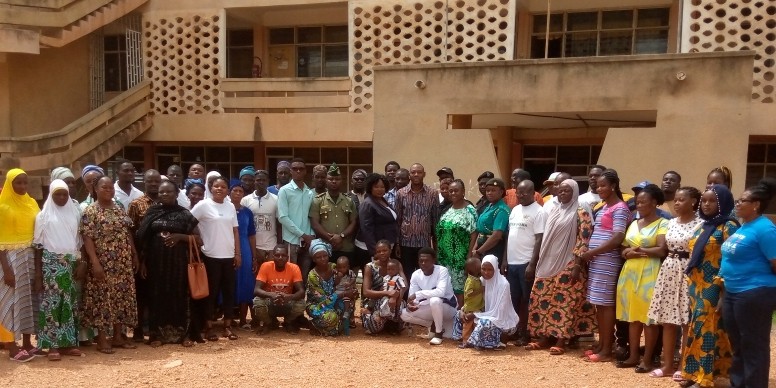The National Peace Council has charged community leaders to work together to manage, resolve and prevent localised conflicts and lead advocacy to strengthen social cohesion, as part of efforts to prevent a spillover of activities of violent extremists.
The Executive Secretary of the Upper East Regional Peace Council, Ali Anankpieng, who made the call noted that unresolved conflicts such as chieftaincy, land and farmer-herder-related issues at the community level are fertile grounds for perpetrators of violence, particularly violent extremists to exploit.
He stressed the urgent need for community leaders such as family heads, traditional and religious leaders, opinion leaders and assembly members among others to work in unison to resolve conflicts in their respective communities and enable them to live in peace.
The Executive Secretary was speaking to the Ghana News Agency on the sidelines of a stakeholder engagement at Bongo, organised by the National Peace Council as part of the “Enhancing Social Cohesion and Social Contract through Empowering Women and Youth in Northern Ghana project”.
The project, which is being implemented in the Bongo, Bawku West and Garu Districts is funded by the United Nations Peacebuilding Fund through the United Nations Development Programme (UNDP) and the United Nations Population Fund (UNFPA).
The forum which brought together traditional and religious leaders, assembly members, women and youth leaders, security services and other state institutions among others from Namoo, Feo and Soe communities aimed to equip the stakeholders with conflict management and resolution skills, techniques to detect violent extremism and political vigilantism among others, to help resolve and prevent conflicts and violent extremism.
The stakeholders were taken through the linkage between human rights, responsibilities and conflicts and how the denial of one’s right could lead to violent conflict.
Mr Anankpieng noted that greed, discrimination and unfair treatment against minority groups were some of the major causes of the numerous localised conflicts being recorded in the country and underscored the need for community leaders to fight such abuses to promote social cohesion.
“You need to be more vigilant about violent extremism and if you identify something suspicious, report it to the security services. This year also being an election year, we expect you in the interest of the communities to have one voice and demand your rights from the political parties,” he said.
Madam Janet Dedei Sarney-Kuma, the Director in charge of Capacity Development and Outreach, the National Peace Council, noted that the project aimed to build the resilience of the communities to manage basic conflicts within their communities, to prevent violence and enhance development in Northern Ghana.
The Bongo District Director of the National Commission for Civic Education, Alice Ndego, noted that the project was timely as the country geared towards the general election and advised the participants to share the knowledge with their communities, to achieve the intended objectives.
Pognaba Felicia Agampoka, the Divisional Queenmother of Feo, commended the National Peace Council and its partners for their efforts in enlightening the community. She highlighted that the training has significantly enhanced the skills of traditional leaders in resolving conflicts and misunderstandings within their communities.
Latest Stories
-
Government will not renew Zoomlion contract – Presidency
2 minutes -
Happy FM, Asaase Radio, Wontumi FM and 59 others shut down for ‘regulatory breaches’
29 minutes -
Elie Kamano’s song amplifies Pan-African Reparations call with music video
32 minutes -
Yango Ghana celebrates partner drivers to mark International Drivers Day 2025
42 minutes -
Global tariff disputes could benefit Ghana – Michael Kottoh
44 minutes -
We waste human resource and over-politicise the system – Prof Adu-Gyamfi
1 hour -
CHRAJ joins global effort to commemorate 2025 World Day against child labour
1 hour -
Military reshuffle will boost morale – Defence Minister
1 hour -
Ghana lost its direction after independence – Prof Yaw Adu-Gyamfi
1 hour -
Technology brand, TECNO becomes global partner of the TotalEnergies CAF AFCON 2025 & 2027
1 hour -
MTN Ghana begins 21 Days of Y’ello Care with focus on digitalisation in rural communities
2 hours -
Professor Adu-Gyamfi backs constitutional reforms, calls for return of power to the people
2 hours -
Ghana’s health system is ill-structured and lacks discipline – Prof Adu-Gyamfi
2 hours -
We let ourselves down – Antwi reflects on Kotoko’s title miss
2 hours -
Health Minister owes nurses an apology; his actions are killing patients – Former GRNMA President
2 hours

